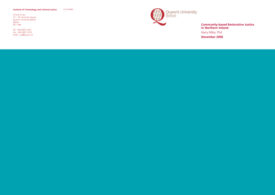Community-based Restorative Justice in Northern Ireland
Resource type: Evaluation
Community Restorative Justice Ireland and Northern Ireland Alternatives |
This report presents independent evaluation findings regarding the work of Community Restorative Justice Ireland (CRJI) and Northern Ireland Alternatives (NIA) in facilitating and promoting non‐violent community alternatives to paramilitary punishment attacks and exclusions relating to alleged localised crime and anti‐social behaviour. The Institute of Criminology and Criminal Justice, School of Law, Queen’s University Belfast, prepared the evaluation commissioned by The Atlantic Philanthropies. Queen’s University, CRJI and NIA are Atlantic grantees.
A continuing legacy of the conflict in Northern Ireland (NI) has been the use of beatings, shootings and exclusions by paramilitary organisations as a response to local crime and anti‐social behaviour. Over the period 1998/99 to 2004/2005, more than 1,800 paramilitary‐style shootings and assaults have been recorded in NI.
This report focuses exclusively on the work supported by The Atlantic Philanthropies (1999‐2005), particularly during the period 2003 to 2005 (Phase II) which was restricted to eight identified sites and the achievement of decreased levels of punishment attacks, leading to the end of punishment violence directed at alleged anti‐social behaviour, and increased levels of reintegration intocommunities.
SUMMARY FINDINGS AND CONCLUSIONS
CRJI and NIA are important catalysts for developing community and local organisational capacities and local peace‐building, by creating and promoting non‐violent responses to crime and anti‐social behaviour. They have trained hundreds of community volunteers across Northern Ireland in conflict resolution theory and skills, and have collaborated with a range of statutory and community organisations and initiatives to build the service infrastructure of local areas.
Both projects contributed to increasing tolerance in local areas for marginalised members of the community, including delinquent youth and former combatants. Local organisations and community groups, through their efforts to create responsive and responsible restorative justice programming, have become more aware and attentive to rights and rights protection, rights entitlement, access to rights, and redress.
In conclusion, NIA and CRJI projects are having a measurable and significant impact. Although faced with a variety of challenges, the models work ‐ without the support of Atlantic Philanthropies, the community‐based projects would have been unable to prevent some 500 instances of punishment and exclusion. In the final analysis, punishment violence, threat and exclusion cannot end solely because of the existence of community‐based restorative justice projects. There is little debate amongst the broad spectrum of individuals consulted over the course of this evaluation, that what is desperately needed in all working class areas of Northern Ireland is cooperation and collaboration between Government, statutory organisations, and properly resourced community counterparts.
